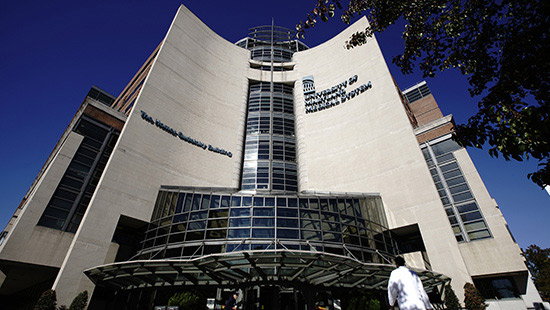Curriculum

Our fellows train at three affiliate hospitals as part of their clinical education. Learn more.
First Year
In the first year, the fellow will complete eight months of inpatient consultation service, which covers University of Maryland Medical Center (UMMC) and the Baltimore VA Medical Center (BVAMC).
Clinical faculty serve as the supervising attending physician and will see and discuss the case after the fellow performs the initial consultative evaluation.
As rheumatology is practiced primarily in the outpatient setting, the fellow will attend continuity clinics at the University Health Center (UHC) and BVAMC on a weekly basis. Each fellow is assigned a panel of patients and will take primary responsibility for their care over the duration of their fellowship.
Additional outpatient experiences include a once-monthly osteoporosis and metabolic bone clinic, VA arthritis clinic and an ambulatory pediatric rheumatology experience. A musculoskeletal ultrasound experience is also available.
The fellow will gain competence in performing and interpreting tests and procedures involved in the evaluation of patients with rheumatic diseases, including:
- arthrocentesis
- joint and soft tissue injection
- synovial fluid analysis
- musculoskeletal imaging (bone and joint radiographs)
- bone densitometry
- electromyography and nerve conduction tests
- serologic testing
The fellow participates in all divisional conference activities.
Second Year
The second year fellow completes a total of four months of inpatient consultation, while continuing to see patients in their weekly UHC and BVAMC continuity clinics. The remaining time is dedicated to clinical electives and the pursuit of scholarly activity. Additionally, second year fellows are responsible for the majority of medical student and house staff training on rheumatology electives.
In addition to continuity clinics, second year fellows will work directly with the fellowship program director in a bi-weekly clinic at the faculty practice at UM Rehabilitation & Orthopaedic Institute (UM ROI) as well as a bi-weekly lupus clinic at UHC with Dr. Violeta Rus.
The second year fellow is expected to pursue scholarly activities. These may include participation in an ongoing faculty clinical or basic research project, a fellow-led novel research project, a quality-improvement project, book chapter or peer-edited manuscript. All scholarly activity is directly supervised by a faculty mentor.
The fellow participates in all divisional conference activities.
Training Sites
Fellows will train at three different affiliate hospitals, including:
- University of Maryland Medical Center
- Baltimore Veterans Affairs Medical Center
- University of Maryland Rehabilitation & Orthopaedic Institute
Didactic Education
Divisional Conferences
Rheumatology faculty, fellows and other rotating trainees meet one morning each week for divisional didactics. These educational conferences may include:
- rheumatology grand rounds
- clinical and basic science journal club
- core clinical conference
- CARE question board review
- lectures from specialists involved in multi-disciplinary rheumatologic care
Fellows also attend a monthly musculoskeletal radiology conference.
National Conferences
Fellows are supported to attend national conferences. Some of the conference options include:
- First Year Fellows Conference in Philadelphia, PA
- American College of Rheumatology Convergence Meeting (ACR)
- State of the Art Clinical Symposium (ACR-SOTA)
The division also participates in the yearly ACR sponsored In-Training Exam (ITE).
